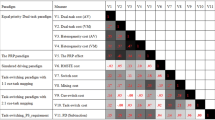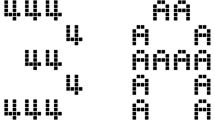Abstract
Adults with ADHD have problems in everyday multitasking situations presumably because of deficits in executive functions. The present study aims to find out (a) whether adults with ADHD show deficient multitasking performance in a standardized task, (b) how they perceive the multitasking situation, and (c) which task structure might be beneficial for them as compared with adults without ADHD. Therefore, we experimentally compared task performance, mood, and motivation in a group of 45 men with ADHD (M-age = 34.47, SD = 9.95) with a comparison group of 42 men without ADHD (M-age = 31.12, SD = 10.59) in three conditions: (a) a multitasking paradigm, (b) an interleaving condition in which tasks had to be performed without planning or monitoring, and (c) a non-interleaving condition. Our results showed no impaired multitasking performance in adults with ADHD. However, they showed better mood and more motivation in the non-interleaving condition.

Similar content being viewed by others
References
Adler LA, Barkley RA, Wilens TE, Ginsberg DL (2006) Differential diagnosis of attention-deficit/hyperactivity disorder and comorbid conditions. Prim Psychiatry 13:1–14
Antrop I, Roeyers H, Van Oost P, Buysse A (2000) Stimulation seeking and hyperactivity in children with ADHD. J Child Psychol Psychiatry 41:225–231
Aster M, Neubauer A, Horn R (2006) Wechsler-Intelligenztest für Erwachsene: Übersetzung und Adaption der WAIS-III von David Wechsler [Wechsler intelligence test for adults: Translation and adaptation of WAIS-III by David Wechsler]. Harcourt Test Services, Frankfurt/M
Barkley RA (1990) Attention-deficit hyperactivity disorder: a handbook for diagnosis and treatment. Guilford Press, New York
Barkley RA, Murphy KR (2010) Impairment in occupational functioning and adult ADHD: the predictive utility of executive function (EF) ratings vs. EF tests. Arch Clin Neuropsychol 25:157–173
Barrilleaux K, Advokat C (2009) Attribution and self-evaluation of continuous performance test task performance in medicated and unmedicated adults with ADHD. J Atten Disord 12:291–298
Bekker EM, Overtoom CCE, Kenemans JL, Kooij JJ, de Noord I, Buitelaar JK et al (2005) Stopping and changing in adults with ADHD. Psychol Med 35:807–816
Biederman J, Mick E, Faraone SV (2000) Age-dependent decline of symptoms of attention deficit hyperactivity disorder: impact of remission definition and symptom type. Am J Psychiatry 157:816–818
Biederman J, Petty C, Fried R, Fontanella J, Doyle AE, Seidman LJ, Faraone SV (2006) Impact of psychometrically defined deficits of executive functioning in adults with ADHD. Am J Psychiatry 163:1730–1738
Boonstra AM, Oosterlaan J, Sergeant JA, Buitelaar JK (2005) Executive functioning in adult ADHD: a meta-analytic review. Psychol Med 35(8):1097–1118
Boonstra AM, Kooij JJS, Oosterlaan J, Sergeant JA, Buitelaar JK (2010) To act or not to act, that’s the problem. Primarily inhibition difficulties in adult ADHD. Neuropsychology 24:209–221
Bortz J, Döring N (2006) Forschungsmethoden und Evaluation für Human- und Sozialwissenschaftler, 4th edn. Springer, Berlin
Bradley MM, Lang PJ (1994) Measuring emotion: the self-assessment manikin and the semantic differential. J Behav Ther Exp Psychiatry 25:49–59
Brickenkamp R (2002) Test d2: Aufmerksamkeits-Belastungs-Test. Hogrefe, Göttingen
Brown TE (1995) Differential diagnosis of ADD versus ADHD in adults. In: Nadeau KG (ed) A comprehensive guide to attention deficit disorder in adults: research, diagnosis, and treatment. Brunner/Mazel, Inc, Philadelphia
Bullinger M, Heinisch M, Ludwig M, Geier S (1990) Scales for the assessment of emotional well-being: psychometric analysis of the profile of mood states (POMS) and of the psychological general well-being index (PGWI). Zeitschrift für Differentielle und Diagnostische Psychologie 11:53–61
Burgess PW (2000) Strategy application disorder: the role of the frontal lobes in human multitasking. Psychol Res 63:279–288
Burgess PW, Alderman N, Evans JJ, Wilson BA, Emslie H, Shallice T (1996) Modified six elements test. In: Wilson BA, Alderman N, Burgess PW, Emslie H, Evans JJ (eds) Behavioral assessment of the dysexecutive syndrome. Thames Valley Test Company, Bury St. Edmunds
Chan RCK, Guo M, Zou X, Li D, Hu Z, Yang B (2006) Multitasking performance of Chinese children with ADHD. J Int Neuropsychol Soc 12:575–579
Channon S, Pratt P, Robertson MM (2003) Executive function, memory, and learning in Tourette’s syndrome. Neuropsychology 17:247–254
Clark C, Prior M, Kinsella GJ (2000) Do executive function deficits differentiate between adolescents with ADHD and oppositional defiant/conduct disorder? A neuropsychological study using the six elements test and Hayling sentence completion test. J Abnorm Child Psychol 28:403–414
Csikszentmihalyi M, Csikszentmihalyi ISC (1992) Optimal experience: psychological studies of flow in consciousness. Cambridge Univ. Press, Cambridge
Donders J, Zhu J, Tulsky D (2001) Factor index score patterns in the WAIS-III standardization sample. Assessment 8:193–203
Elliot AJ (1999) Approach and avoidance motivation and achievement goals. Educ Psychol 34:169–189
Friedman SR, Rapport LJ, Lumley M, Tzelepis A, VanVoorhis A, Stettner L et al (2003) Aspects of social and emotional competence in adult attention-deficit/hyperactivity disorder. Neuropsychology 17:50–58
Gawrilow C, Gollwitzer PM (2008) Implementation intentions facilitate response inhibition in children with ADHD. Cogn Ther Res 32:261–280
Gawrilow C, Gollwitzer PM, Oettingen G (2011) If-then plans benefit executive functions in children with. J Soc Clin Psychol (in press)
Hervey AS, Epstein J, Curry JF (2004) The neuropsychology of adults with attention deficit hyperactivity disorder: a meta-analytic review. Neuropsychology 18:485–503
Hoza B, Pelham WE, Dobbs J, Owens JS, Pillow DR (2002) Do boys with attention-deficit/hyperactivity disorder have positive illusory self-concepts? J Abnorm Psychol 111:268–278
Jerome L, Segal A, Habinski L (2006) What we know about ADHD and driving risk: a literature review, meta-analysis and critique. J Can Acad Child Adolesc Psychiatry 15:105–125
Knouse LE, Paradise MJ, Dunlosky J (2006) Does ADHD in adults affect the relative accuracy of metamemory judgments? J Atten Disord 10:160–170
Krause J, Krause K-H (2009) ADHS im Erwachsenenalter: Die Aufmerksamkeitsdefizit-/Hyperaktivitätsstörung bei Erwachsenen, 3rd edn. Schattauer, Stuttgart
Lewis RF, Rennick PM (1979) Manual of the repeatable cognitive-perceptual-motor battery. Axon, Grosse Pointe Park
Miyake A, Friedman NP, Emerson MJ, Witzki AH, Howerter A (2000) The unity and diversity of executive functions and their contributions to complex “frontal lobe” tasks: a latent variable analysis. Cogn Psychol 41:49–100
Nigg JT, Stavro G, Ettenhofer M, Hambrick D, Miller T, Henderson JM (2005) Executive functions and ADHD in adults: evidence for selective effects on ADHD symptom domains. J Abnorm Psychol 114:706–717
Norman DA, Shallice T (1986) Attention to action: willed and automatic control of behavior. In: Davidson RJ, Schwartz GE, Shapiro D (eds) Consciousness and self-regulation: advances in research and theory. Plenum Press, New York
Paul–Jordanov I, Bechtold M, Gawrilow C (2010) Methylphenidate and if-then plans are comparable in modulating the P300 and increasing response inhibition in children with ADHD. ADHD 2:115–126
Pennington BF, Ozonoff S (1996) Executive functions and developmental psychopathology. J Child Psychol Psychiatry 37:51–87
Rapport LJ, Friedman SL, Tzelepis A, van Voorhis A (2002) Experienced emotion and affect recognition in adult attention-deficit hyperactivity disorder. Neuropsychology 16:102–110
Roberts W, Fillmore MT, Milich R (2011) Separating automatic and intentional inhibitory mechanisms of attention in adults with attention-deficit/hyperactivity disorder. J Abnorm Psychol 120:223–233
Rucklidge J, Brown D, Crawford S, Kaplan B (2007) Attributional styles and psychosocial functioning of adults with ADHD: practice issues and gender differences. J Atten Disord 10:288–298
Sattler JM (1992) Assessment of children’s intelligence. Academic Press, San Diego
Seidman LJ, Biederman J, Weber W, Hatch M, Faraone SV (1998) Neuropsychological function in adults with attention-deficit hyperactivity disorder. Biol Psychiatry 44:260–268
Shallice T (1982) Specific impairments of planning. Philos Trans R Soc Lond 298:199–209
Shallice T (1988) From neuropsychology to mental structure. Cambridge University Press, Cambridge
Shallice T, Burgess PW (1991) Deficits in strategy application following frontal lobe damage in man. Brain 114:727–741
Siklos S, Kerns KA (2004) Assessing multitasking in children with ADHD using a modified six elements test. Arch Neuropsychol 19:347–361
Sonuga–Barke EJS (2002) Psychological heterogeneity in AD/HD—a dual pathway model of behaviour and cognition. Behav Brain Res 130:29–36
Sonuga–Barke EJS (2003) The dual pathway model of AD/HD: an elaboration of neuro-developmental characteristics. Neurosci Biobehav Rev 27:593–604
Sonuga–Barke EJS (2005) Causal models of attention-deficit/hyperactivity disorder: from common simple deficits to multiple developmental pathways. Biol Psychiatry 57:1231–1238
Spencer TJ, Biederman J, Mick E (2007) Attention-deficit/hyperactivity disorder: diagnosis, lifespan, comorbidities, and neurobiology. Ambul Pediatr 7:73–81
Tabachnick BG, Fidell LS (2007) Using multivariate statistics, 5th edn. Allyn and Bacon, Boston
Thorell LB, Lindqvist S, Bergman S, Bohlin G, Klingberg T (2008) Training and transfer effects of executive functions in preschool children. Dev Sci 12:106–113
Tucha O, Mecklinger L, Laufkötter R, Kaunzinger I, Paul GM, Klein HE, Lange KW (2005) Clustering and switching on verbal and figural fluency functions in adults with attention deficit hyperactivity disorder. Cogn Neuropsychiatry 10:231–248
Wechsler D (1997) Wechsler memory scale—third edition: administration and scoring manual. The Psychological Corporation, San Antonio
Willcutt EG, Doyle AE, Nigg JT, Faraone SV, Pennington BF (2005) Validity of the executive function theory of attention-deficit/hyperactivity disorder: a meta-analytic review. Biol Psychiatry 57:1336–1346
Wilson BA, Alderman N, Burgess PW, Emslie H, Evans JJ (eds) (1996) Behavioral assessment of the dysexecutive syndrome. Thames Valley Test Company, Bury St. Edmunds
Wittchen H-U, Zaudig M, Fydrich T (1997) SKID-II: Achse II: Persönlichkeitstörungen: Interviewheft. In Wittchen H-U, Zaudig M, Fydrich T (eds) SKID: Strukturiertes Klinisches Interview für DSM-IV; Achse I und II. Hogrefe, Göttingen
World Health Organization (2009) International statistical classification of diseases and related health problems (ICD-10) (10th revision). WHO, Genev
Zimmermann P, Fimm B (2006) Testbatterie zur Aufmerksamkeitsprüfung (TAP) [Testbatterie for Attentional Performance]. Psytest, Herzogenrath
Zimmermann P, Messner C, Poser U, Sedelmeier P (1991) Ein Fragebogen erlebter Defizite der Aufmerksamkeit (FEDA)[Questionnaire of Experienced Deficits in Attention]. Unpublished Manuscript, University of Freiburg
Author information
Authors and Affiliations
Corresponding author
Rights and permissions
About this article
Cite this article
Gawrilow, C., Merkt, J., Goossens–Merkt, H. et al. Multitasking in adults with ADHD. ADHD Atten Def Hyp Disord 3, 253–264 (2011). https://doi.org/10.1007/s12402-011-0056-0
Received:
Accepted:
Published:
Issue Date:
DOI: https://doi.org/10.1007/s12402-011-0056-0




